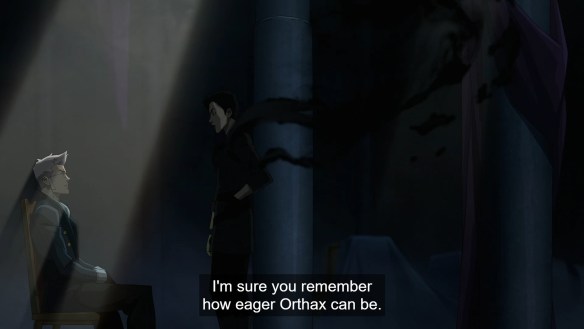Hello folks, and welcome back to Wrong Every Time. Today I’m happy to announce we’re diving back into The Legend of Vox Machina, and continuing our thorough investigation of tabletop gaming’s intersection of narrative and game design, as well as how all that nonsense might be translated back to a linear adapted narrative. It’s a heady stew of variables, and involves basically everything I’m passionate about – storytelling, mechanical design, constructing durable characters, roleplay and performance, and so on. The beauty of DnD is that it can be whatever you choose to bring to it; the stories you build are limited only by your imagination and mechanical ingenuity, as you seek to collectively build a fantasy where you are both authors and audience.
Our last episode pushed the story forward significantly, using the party’s aborted dragon assault to steer them towards a new quest and new ally. Failure can be an excellent teacher, particularly when you don’t want to outright force your party into some course of action; they can always try to attack the final boss at level one, but no one should feel surprised or railroaded when the obvious happens. In fact, that assumption of initial failure is basically the core mechanic of Curse of Strahd, where my current party is in the process of collecting their own quasi-Vestiges in order to be strong enough to fight the vampire Strahd.
“Collect the sacred stones/weapons” is, admittedly, a pretty simplistic and gamified style of fantasy adventure. And when combined with Strahd’s one-note NPCs, our quest leaves little room for character development within the confines of the overt narrative. As I mentioned last time, worlds that adhere to DnD’s traditional moral alignment system are inherently averse to moral complexity or character growth – they frame morality as intrinsic, not something you develop, and there’s not much room for meaningful storytelling there.
As such, we’ve been largely avoiding conversation with NPCs, and instead have been building narratives of personal growth between our party members, through things like letting our noble-hating pirate and foppish son of privilege come to respect each other, all while my put-upon goblin Tilly does her best to keep the peace. It’s been an interesting exercise in carving out dramatic agency within the space directly afforded to players, though at this point, we’re all quite eager to get to something more specifically molded towards our journeys – like, say, how Percy’s lingering insecurities are reflected through the actual character of Anna Ripley! Great transition me, let’s go with that. Onward to the episode!
Episode 2
We open on Percy waking up in chains, as Ripley discusses his fate with his old patron. Percy seems to be some unholy mixture of a fighter, artificer, and warlock, demonstrating an ambition of fundamental design reflective of a player who loves tinkering with mechanical systems and doing a bunch of extra back-end labor. Keeping such a player satisfied is tricky as a DM; you want to reward their passions, but you also don’t want them to either break the game balance or take up too much time with their extra systems. We actually had an artificer who suffered from both those issues in our first campaign, and I’ve been pretty hesitant to engage with the class since
Ripley introduces the hungry ghost raven monster as “Orthax.” I quite like this development – having a character’s former patron spin off into a vengeful antagonist is a great fusion of the narrative and mechanical, naturally emphasizing how your choices can have lasting consequences
“Without your design, we never would have been able to upgrade it.” Percy’s inventions are further affecting the world at large, offering another fusion of mechanical player action and larger worldbuilding consequences. When you have a chance to make your players’ actions important on a larger scale, it’s generally worthwhile to grab it – the more you can tether their actions to the fate of the world, the more they’ll feel a sense of ownership and responsibility towards that world. One of my last campaign’s characters actually founded a company designed to sell party-branded merchandise, and our post-campaign excursions now frequently bring up the existence of party plushies and action figures in unexpected corners of the world
“Share your gifts with the wide, wide world.” Yep, Percy’s inventions are gonna instigate an age of terrifying mechanical weaponry. It’s nice to feel important!
Oh shit, new OP!
Interesting – this one’s not as much of a divergence from the show’s general aesthetic, making me presume they didn’t actually outsource it this time. A credit to the show’s generally improving animation quality
“Those are the Hands of Ord. You do not want to cross them, or their master.” Practically every campaign needs some device for announcing “do not fight these guys. Killing them will not improve your situation.” As it turns out, in a combat simulator game where most of your character abilities are tied to inflicting damage, violence is rarely something the characters consider a “last resort”
But with Scanlan absent, their resident distraction specialist is unavailable, and thus Gilmore gets them past the guards. I imagine this played out a little differently at the table; introducing a challenge only to have the DM’s own characters solve that challenge isn’t particularly satisfying for players
Meanwhile, Ripley continues to insist that the answer to a bad guy with a gun is a good guy with a gun
Vex gets to show off her tracking powers as they hunt down Ripley. For combat-oriented classes, making your players feel important generally just demands engaging combat encounters. For others, things are trickier – rangers demand tracking and natural environments, bards demand social situations to manipulate, etcetera. One of our current campaign’s issues is that one of our players is playing a bard in Curse of Strahd, where basically everyone is dour and distrusting, leaving little opportunity for flavorful character moments
“My factory is inevitable. Wouldn’t you rather be the one at the controls?” I’m actually experimenting in a similar space with my party’s post-campaign adventures. To combat an otherworldly new threat, they need to make use of a powerful, experimental form of magic – but of course, even harnessing that power for such noble ends means it’s ultimately going to take its place in the world as a new superweapon. I’m looking forward to exploring the consequences
Quite enjoying the sleuthing the rest of the party is engaged in. DnD includes the perception skill for general awareness checks and the investigation skill for looking at things closely, but beyond that it’s up to the DM to craft a mystery worth caring about. I consider “roll for investigation, cool you solved it” to not be a particularly satisfying investigative adventure, so I appreciate all the tricks Mercer is using here – offering diverse clues and veins of inquiry, leaving a trail of breadcrumbs that must be followed one by one, and asking the party to recall prior information in order to put their current information into context. “Look closer” is always a tall order in a game with no natural visual component, but there are ways to turn investigations into genuine gameplay, rather than just a dice roll
In general, I find there to be an intriguing tension at the core of DnD – everything is ultimately decided by dice rolls, but dice rolls are not interesting mechanical or emotional drama, so the trick of any ambitious DM is to find methods of embellishing or circumventing the game’s own core mechanics. If the players can describe a genuinely cunning plan, or provide a legitimately convincing argument, I’ll value that far more than the roll of a dice
Of course, that can in turn lead to an awkward situation where characters who’ve invested their skills in the mechanical methods of improving charisma or awareness feel shortchanged – if the more combat-oriented players can just “pretend better” and thereby equal their hard-earned abilities, what was the point? It’s a tricky business to manage, and demands lots of ad-hoc judgments
We see precisely that tension at play as Grog manipulates some kids into telling him where they’ve seen tinderboxes. Grog has the intelligence of a picket fence and presumably even less charisma, but “Grog can connect with kids” is a slam dunk of characterization, so you gotta give him this one
Another chase scene as the guards finally track down our heroes. I really do have to check out these long-form episodes, I’ve been trying to DnD-ify chase scenes for years and still haven’t gotten them to a satisfying spot
Meanwhile, Scanlan attempts to make good with his daughter. Scanlan’s an interesting one; he’s generally the most disruptive when it comes to the high fantasy dragon-fighting business, but he’s also game for entirely in-character personal drama like this. Frankly, his dramatic interests seem to mirror my own – I’m generally more interested in personal motivation than big external threats
Of course, a good DM can accommodate either of these preferences. I sort of ended up with a Three Bears situation in my campaign, where one player wanted no backstory, one wanted just a sprinkling of origin-relevant threads to invest in, and one got an entire family estate and magical academy’s worth of prior acquaintances to interact with
The party arrives just in time to save Percy after he heroically detonates Ripley’s trinkets. I imagine managing Percy’s abilities required a great deal of off-table discussions between him and Mercer
After Ripley flees, the party is captured by the city guards. Another effective way to say “don’t fight these guys” – having them appear at the end of a battle that has already expended the party’s resources
Interesting tension as Scanlan attempts to break the ice with his daughter. Feels they’re effectively characterizing him as someone who doesn’t actually belong on this adventure, which is certainly an interesting choice for DnD
The rest of the gang are taken before the city’s leader J’mon Sa Ord, who immediately trips Vex’s dragon radar
Excellent “contributions” by Keyleth, as she swiftly spills that they were actually sent on this mission by an untrustworthy dragon. DnD is collective storytelling, not just triumphing over fantasy challenges, and sometimes that means the best way you can pitch in is by letting your character make in-character mistakes
With a death sentence pending, Percy attempts to throw himself on the spear, stating the murder was all his fault. Frankly, moments like this are almost freebies for character growth; it’s easy to risk your life for the party when the DM actually taking your life would destroy the narrative. Some DMs and player groups certainly lean more towards character death as a spicy random possibility at any moment, but speaking personally, my love of genuinely compelling, coherent stories heavily outweighs my dedication to DnD’s random possibilities
The party reunite with Scanlan in characteristic form: collapsed in his own vomit, having failed to impress his daughter
He’s fortunately just in time to save Percy from being… something-ed. Turned into a dragonborn, maybe? Presumably a consequential yet manageable curse, respecting his sacrifice without removing him from the table
And J’Mon Sa Ord reveals the real plate is tucked safely away, with a demon, in hell. I smell a new adventure!
And Done
Excellent work, team! Through a combination of moderate cunning, significant violence, and incidental binge drinking, you have successfully discovered the actual location of the treasure you came here for, while at least making some powerful new friends in the process. The journey there certainly offered us plenty to dig into mechanically, from the proper methods of embellishing investigation checks to the interesting long-term possibilities provided by players’ evolving identities. Both Percy and Scanlan had some compelling material here demonstrating the diversity of ways one can carve their signature into a DnD adventure, be their methods mechanical or character-driven. And with the party now headed for hell, I’m eager to see how Mercer’s conception of the underworld compares to my own rough ideas. Onward to the City of Dis!
This article was made possible by reader support. Thank you all for all that you do.




